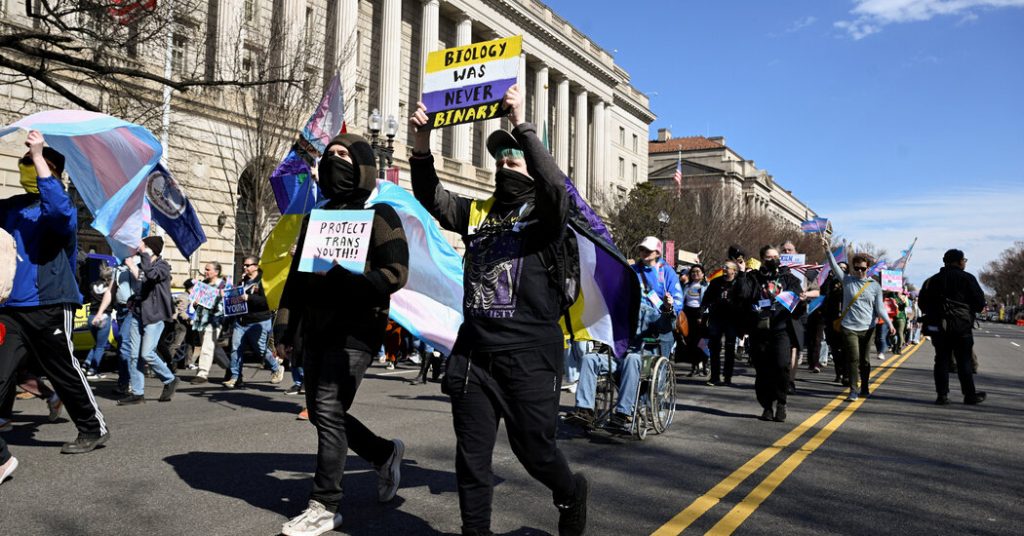A Divisive Showdown in the Senate: Blocking a Bill on Transgender Athletes in School Sports
On Monday, the U.S. Senate witnessed a heated political showdown as Democrats successfully blocked a Republican-backed bill aimed at barring transgender women and girls from participating in school sports teams designated for female students. The bill, which had earlier passed the House of Representatives in January, was the latest in a series of efforts by Republicans to use transgender rights as a political lever, particularly as the nation gears up for President Trump’s second term. The measure stalled in the Senate after a party-line vote of 51 to 45, falling short of the 60 votes needed to overcome a filibuster and proceed to further consideration.
The bill sought to prohibit federal funding for K-12 schools that allow transgender students to participate in women’s and girls’ athletic programs. It aligns with one of the goals outlined in an executive order signed by President Trump last month, titled “Keeping Men Out of Women’s Sports.” This executive order directed the Education Department to reinterpret civil rights laws, effectively threatening schools with the loss of federal funding if they failed to exclude transgender athletes from women’s sports. Senate Republicans argued that the bill was necessary to protect girls from what they described as predatory men encroaching on private spaces and gaining an unfair athletic advantage based on sex. However, their rhetoric also hinted at a broader political strategy, with Senator John Thune of South Dakota, the Republican majority leader, framing the issue as a choice for Democrats: “Democrats can stand for women or stand with a radical transgender ideology. If they oppose the legislation, they’ll have to answer to the women and girls they vote to disenfranchise.”
Democrats Denounce the Bill as a Political Ploy
Democrats sharply criticized the legislation, calling it a cynical attempt by Republicans to exploit a vulnerable population—transgender children—for political gain. Senator Brian Schatz of Hawaii dismissed the bill as an effort to “stir up a culture war and divide people against each other,” arguing that it was “totally irrelevant to 99.9 percent of all people across the country.” Democrats also contended that the bill would harm the very group it purported to protect—girls—by targeting transgender children who simply want to participate in school activities with their peers. Furthermore, they pointed out that the bill had no enforcement mechanism and could lead to invasive practices, such as subjecting female athletes to physical inspections if their gender was questioned by an opposing team. Senator Richard J. Durbin of Illinois emphasized the human dignity aspect, calling the legislation an attack on transgender individuals and a waste of time.
The Broader Context of the Debate
The bill’s sponsor, Senator Tommy Tuberville of Alabama, a former high school girls’ basketball coach, framed the legislation as evidence of Democrats being out of touch with mainstream America. Republican lawmakers cited polls suggesting that a majority of Americans, including many Democrats, believe that biological males should not compete in women’s sports. While some congressional Democrats acknowledged concerns about transgender athletes at the highest competitive levels, they argued that these decisions should be left to athletic associations rather than being dictated by sweeping federal legislation. They also noted that the issue is far from widespread, with fewer than 10 out of over 500,000 N.C.A.A. athletes identifying as transgender. Moreover, more than two dozen states have already enacted laws barring transgender athletes from participating in school sports, either at the K-12 or collegiate level.
The Political Landscape and the Role of the Filibuster
The blocking of this bill is one of the few remaining ways Democrats can resist the Republican agenda, as they find themselves out of power and in the political wilderness. The filibuster remains a crucial tool for Senate Democrats to prevent legislation that could otherwise reach President Trump’s desk for signature. Earlier this year, Senate Democrats also blocked other Republican measures, including one that would impose criminal penalties on doctors who perform abortions and another that sought to sanction officials associated with the International Criminal Court over its investigation into war crimes involving Israeli leaders. These moves highlight the ongoing tensions between the two parties and the challenges of legislating in a deeply divided government.
Implications and Future Outlook
The failure of this bill in the Senate underscores the polarized nature of American politics, particularly when it comes to issues involving gender identity and civil rights. While Republicans continue to frame the issue as a matter of fairness and protection for women’s sports, Democrats insist that the legislation is a thinly veiled attack on transgender individuals and a distraction from more pressing issues. The debate also reflects a broader cultural divide, with both sides accusing the other of being out of touch with mainstream values. As the nation moves closer to the 2024 election, this issue is likely to remain a flashpoint in the ongoing culture wars, with both parties seeking to rally their respective bases around it.
In the end, the blocked bill serves as a reminder of the challenges of legislating in a hyper-partisan environment. While Democrats have managed to slow down the Republican agenda in the Senate, the broader issue of transgender participation in sports continues to be a contentious and deeply emotional topic, with no clear resolution in sight. The debate raises important questions about the balance between fairness and inclusion, the role of federal versus local decision-making, and the impact of political posturing on vulnerable populations. As the conversation continues, it remains to be seen whether a middle ground can be found or whether this issue will continue to be used as a political weapon in the years to come.


